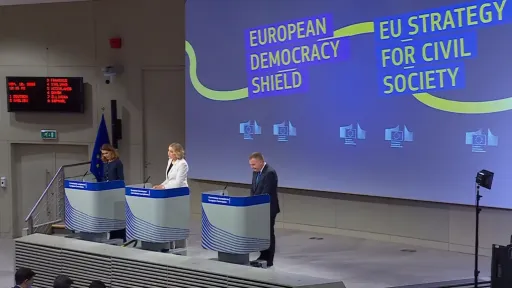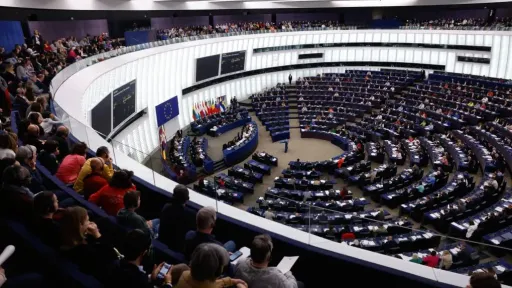EU unveils controversial ‘Democracy Shield’ with new information monitoring center

The move, presented as part of the EU’s broader effort to protect democratic institutions from manipulation, has sparked heated debate over the balance between defending democracy and safeguarding freedom of expression.
According to the Commission, the new body would facilitate information sharing, operational cooperation, and capacity building among member states to tackle foreign information manipulation and interference (FIMI). It would also have a proactive role, potentially including the identification and removal of false or misleading content, said Henna Virkkunen, Executive Vice President for Security and Democracy.
Focus on Russian disinformation
EU High Representative for Foreign and Security Policy Kaja Kallas openly linked the initiative to ongoing efforts to counter Russian propaganda campaigns.
“We are seeing campaigns, including from Russia, specifically designed to polarize our citizens, undermine trust in our institutions, and contaminate our political debate,” she said. “The Democracy Shield is part of Europe’s response to protect the foundations of our democracies.”
Fears of a “European Ministry of Truth”
Critics, however, warn that the proposal risks granting the Commission excessive control over information.
Members of the 5 Star Movement (M5S), Gaetano Pedullà and Danilo Della Valle, denounced the plan as the creation of a “European Ministry of Truth,” arguing that the Commission “has no authority to decide what is or isn’t fake news.”
Within the liberal Renew Europe (RE) group, Sandro Gozi called for stronger scrutiny of social media platforms, particularly X (formerly Twitter), which he accused of “algorithmic manipulation disguised as neutrality” — turning it, he said, into a “chaos machine” that distorts democratic debate.
Support for the initiative
Others see the Democracy Shield as a necessary step in the face of increasing external threats. Nathalie Loiseau, Liberal MEP and chair of the Special Committee on the Democracy Shield, said the proposal represents “a good and necessary first step toward a Union capable of defending democracy.”
Commissioner for Democracy and Justice Michael McGrath acknowledged the sensitivity of the issue, but stressed the importance of action:
“Digital evolution has created new avenues for threats to our stability. The way reality is narrated affects our political and social balance. The new centre will be vital to safeguard the information space — because foreign interference will not simply disappear.”
Funding for independent media
The Democracy Shield will also include increased funding for independent and local journalism through the Media Resilience Programme, which will merge existing support schemes with new funding under the EU’s upcoming multiannual financial framework.
Brussels says the goal is to strengthen media independence and reduce vulnerability to foreign influence, following past controversies such as Voice of Europe, an outlet accused of spreading pro-Russian content.
Still, concerns remain that the Commission will wield significant influence over which outlets receive funding — a decision critics fear could lead to political bias in the distribution of media support.
Balancing democracy and free speech
The Commission insists that the Democracy Shield will not restrict free speech.
“We do not want to narrow the spectrum of democracy,” an EU official said. “Freedom of speech remains for everyone — but citizens must also be free from manipulation.”
As the debate unfolds, the Democracy Shield has emerged as a test case for how far the EU is willing to go to defend democracy without compromising the very freedoms it seeks to protect.







